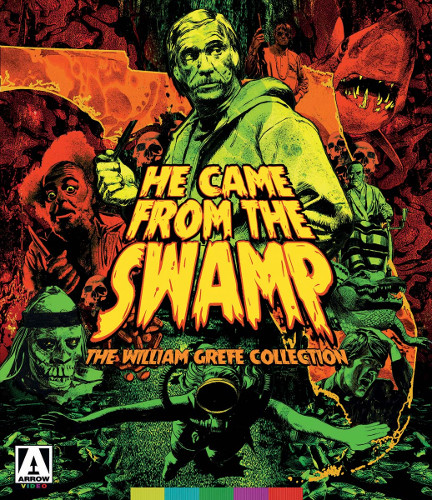
In November, Arrow Video released a series of films from director William Grefé in their HE CAME FROM THE SWAMP boxset, which myself and Dr Lenera reviewed. In the interview below, William Grefé talks about the release and his filmmaking career.
Did you ever think your films would be given the Blu-ray treatment like this?
In all my emails and Facebook, people from all over the world love this Blu-ray edition. I’m hearing from strangers and people I’ve met over the years – it’s interesting how people love the old grindhouse movies. It’s a lost art. Arrow have called this boxset He Came From The Swamp – they won’t let me out of the Everglades however hard I try!
What was it like filming in the Everglades?
I’ve been out in the Everglades ever since I was a kid, because I was born in Miami… The only film I made which was a nightmare, Sting of Death, the producer had never produced a movie, he was a building contractor. He wanted to go to a hunting camp out in the middle of the Everglades. To get there you had to take airboats. We got all the way out there, and the camera had a cord that goes to the battery, and the cord fell overboard… so we couldn’t film… so we had to send the airboat back, and go all the way back to Miami to the equipment house, so I didn’t start shooting until 1 or 2 in the afternoon. From that bad experience I knew areas I could drive to and not experience that, if I had an equipment problem. There’s a lot of areas you can drive to quite easily.
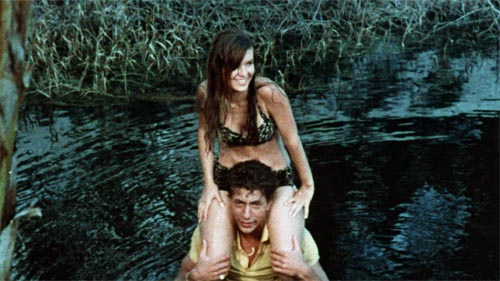
Is it fair to say Sting of Death was your version of Florida classic The Creature From the Black Lagoon?
Sting of Death was my third film – when you look at it today, the jellyfish monster, they’d laugh you out of the theatre… but back then they thought it was great, they loved the jellyfish monster! Anyway, Doug Hobart, he played the jellyfish monster, he also played Tartu in Death Curse of Tartu. He preferred playing Tartu as he created all the makeup – the jellyfish monster was just a big old balloon over his head.
Sting of Death was a double bill with Death Curse of Tartu wasn’t it?
Back in those days, all horror movies were released in double bills. The distributor couldn’t find another horror movie, so he said the magic words – he said he’d finance another movie if we could make one immediately. The magic time for releasing these films was April 15th, because up north all of the drive-in theatres opened – so we had to have both films ready. This was December. I wouldn’t turn the deal down, so I said ‘no problem’. I knew I had to start shooting immediately. So I went home that night, sat down, and said, what can I write about? I took the age-old script – a mummy, in Egypt, the pyramids – anyone who disturbs the pyramid he’ll come back and haunt them. I moved that to the Everglades and made Tartu an ancient Indian witch doctor. I stayed up all night and wrote the script in 24 hours. I started shooting the next day and I shot the film in seven days. Which, nowadays you go on a major film set, it’s seventy or eighty days. Some of the critics used to criticise our films, and I’d say ‘let them try and make a film in seven days and get it distributed’.
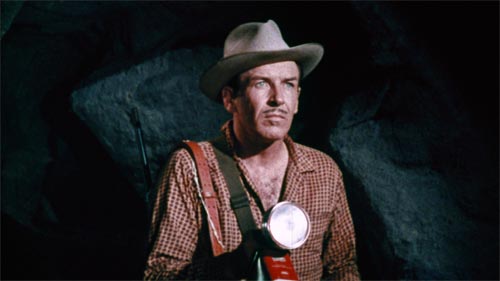
How did you manage to get Hollywood star Rita Hayworth for The Naked Zoo?
I wanted Rita Hayworth for Naked Zoo so I went to Los Angeles. I made that film for $250k. I only had fifty thousand in the budget for the star. So I went to her agent. The agent wanted $250k for Rita. I said, I don’t have it, I only have fifty. He said ‘no deal, no deal’. We fought back and forth for a couple of days. So I called my investors in Miami and said, ‘look you’ve got to trust me on this, wire me fifty thousand dollars’. And so I got a cashiers cheque and walked into the agent and put down the cheque and said ‘I will put this in any bank in California in escrow, for Rita, but that’s all I can afford’, and the agent said ‘we’ve got a deal’. Money talks and you know what walks – BS walks!
Hayworth looked like she was enjoying making the film
Rita was from the old school and I knew that they did seven or eight takes. You see I only do one or two takes, so for the first couple of days I budgeted six or seven takes until she got confidence in me – even though I didn’t need six or seven takes. She was a very very shy person, not like you’d expect. There’s a famous statement I think she made, she said ‘everyone wanted to go to bed with Gilda and they woke up with Rita Hayworth’.
You also worked with the great William Shatner on Impulse
Socrates Ballis, he was in The Hooked Generation, he was one of the Cubans at the beginning that got shot with the speargun. He had worked with me on three or four movies and he wanted to produce a movie, so he went over to Tampa and raised the money then he hired me to direct. We were in the Miami airport, we were flying out to Los Angeles to try and locate a name actor, and Shatner comes walking by. I said ‘There’s William Shatner!’ so we stopped him and gave him our pitch. We never went to Los Angeles – we made a deal right in the airport.
How did you get on with Shatner?
I get along great with Shatner. Shatner is a funny funny guy in person. He has a big ranch in Kentucky – he loves horses – the last time I saw him I said ‘Hey Bill how are the horses?’ and he says ‘Let me tell you this Grefe – you never invest in something that eats while you’re sleeping!’ You can imagine what it costs to feed 25 horses. Anyway he’s really got a great sense of humour.
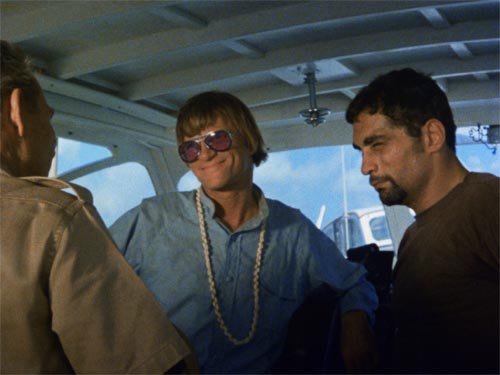
Tell me about your involvement in the James Bond film Live and Let Die
I was at the Cannes film festival – at that time I was president of Ivan Tors film studio, the studio that did Flipper and Gentle Ben and all those series, so I had experience in underwater filming. I met Cubby Broccoli and made the deal at the Cannes film festival, so I did some of the second unit on the Bond film. We shot the shark footage over at Bimini, which is about 50 miles in the ocean off of Miami. We did the crocodile footage in Jamaica.
You have a lot of animals in your films – alligators, snakes, sharks – are you an animal lover?
Well, let’s say I love dogs (laughs). I’ve always had a dog. I love animals, but still, if I’m out in the middle of the Everglades and a water moccasin comes at me, I’m gonna kill him! I’m not going to give it a kiss and say ‘I’m an animal lover, I love you!’. I was at Quentin Tarantino’s theatre out in Los Angeles, he owns his own theatre called the New Beverly, and they screened Stanley and Impulse. The people in the audience said ‘How can you possibly kill one of those rattlesnakes?’ in Stanley.
In the film Stanley there are a LOT of snakes… what was that like to film?
I’ll tell you a real interesting story – when I did Stanley, Crown International, they didn’t believe all the stories I was going to do with snakes. So they sent an executive producer, a guy named Johnny Burrows down, to see if I was full of BS or what. I met him at the airport. He said ‘can I meet your animal trainer?’. Well Frank Weed lived out in the Everglades – we drove out there to his cabin, he wasn’t there but his 18-year-old son was. The son says come in so we went in and right in the middle of his living room in a big wire cage there’s like 10 rattlesnakes in there… and Johnny says ‘what are you doing with these rattlesnakes in the house?’ and he says, ‘well, Bill’s got to use them pretty soon… it’s winter time and he didn’t want them getting cold.’ So Johnny says ‘Do you handle these like your father?’ and the kid says ‘yeah yeah’, and he reaches down in the thing and he grabs a six foot rattlesnake and Johnny says ‘Don’t you ever get bit?’ And the kid says ‘yeah we were out in the Everglades hunting water moccasins as we were getting five dollars a hide to make belts – and i got hit right on the end of my finger by a water moccasin.’ Johnny says ‘what did you do?’ and he says ‘well I kept hunting, but that night my finger turned completely black and swollen, so I cut my finger off.’ Johnny says ‘You cut your finger off!’ And the kid says ‘yeah here it is’, and he reaches over and he’s got a jar of alcohol, and he shows his finger floating in the alcohol. And Johnny says to me, “Ok, we can leave now.” And he never questioned what I was going to do from that day on.
Did you ever think of making a yeti film, because Florida has its own yeti doesn’t it, the skunk ape?
The skunk ape. I knew what the skunk ape was. It was a big, I think, orangutan – some monkey that’s about five feet tall. Frank Weed, my animal trainer – he did Tartu and he did Stanley for me – he had one of those and the thing escaped. I’ll never forget on TV one time, they interviewed a guy, and he was drunk, and he said ‘and the skunk ape jumped on my car, and he was seven feet tall!’. When you’re drunk you think a five foot monkey is seven feet tall. I think it was Frank Weed’s ape – it escaped, and suddenly it became the skunk ape.
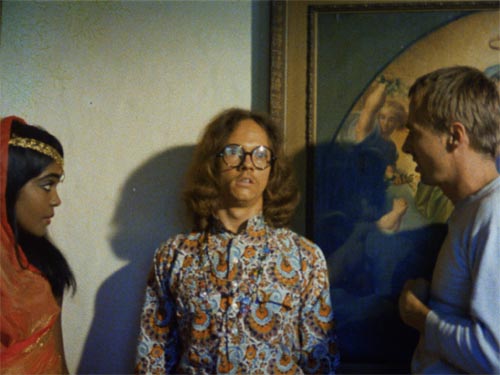
Are you still active in filmmaking?
I was very active with young filmmakers. We did a lot of short films until this virus hit, and that’s sort of put a monkey wrench on filmmaking. If anybody wants to go on YouTube I did a little thing called Thumbs – a little 7 or 8 horror thing I did with a bunch of kids. And I did Consider Us Evil, a horror thing with two girls being held captive.
What advice would you give budding filmmakers?
Today it’s a no brainer, making a film – the cameras are so light, the editing process and sound mixing is so fast. Back in those days it was a nightmare to film – the cameras weighed two hundred pounds, the editing took months, the final mix took forever – now it’s beep, zap, on the computer, it takes no time at all. But I tell young filmmakers, technically it’s nothing to make a film today, but the only thing that hasn’t changed is dealing with actors and crewmembers – you’ve got to be an amateur psychiatrist. You’ve got to figure out everybody, their temperament and how to handle them. When I did Whisky Mountain, we were up in the mountains – and Christopher George had his own TV series called The Rat Patrol, and he was in three John Wayne movies. He comes up to the mountains and walks in the office and says “where’s my trailer?” and I say well uh you don’t have your own trailer, I have one Winnebago but it’s for you four actors, and for make-up and wardrobe. He said “on the John Wayne movies I had my own trailer!” and I said well I’m not John Wayne. You’re now on a Bill Grefe movie. So he was pretty good about it. He shared the Winnebago… now we’re going way out in the country, and we had to tow a generator, we only had one truck. The head grip came and said ‘Bill, you’ve got these two portapotties on a flatbed, how are we going to tow those out?’ I said, look the actor’s Winnebago has a trailer hitch, hook it to that. Chris George comes up to me and says, “Grefe I’ve put up with a lot of your… I won’t say the word… but if they ever find out in Hollywood I had to tow two shitters to the location I’ll never work again!” But anyway he was a good sport about it.
So you have to be resourceful?
In Hollywood they throw money at problems – on independent films you’ve got to use your brain in pre-production. The big mistake kids make is they fight to get the money to make a movie and they don’t prepare it properly. All the films except Death Curse and Stanley, I always took six to eight weeks prep. Where I knew everything and I had blocked the shots on paper. Kids just start right in and can’t figure out why they’re over budget or schedule. You’ll never hear this from anybody else – I’ve made way over 15 films, I’ve never been one day over schedule or one dollar over budget. I don’t think there’s a filmmaker in the world that can make that statement!
Thanks for your time Bill.
Thank you. Everybody stay safe and let’s get over this virus so we can get back to filmmaking!
He Came from the Swamp: The William Grefé Collection is available on Limited Edition Blu-ray from Arrow Video and is available to stream on ARROW www.ARROW-Player.com


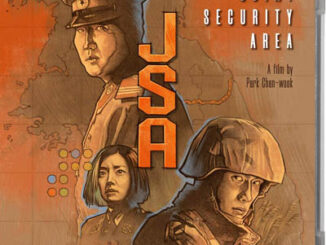
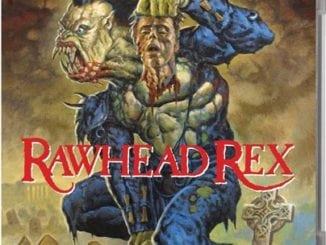
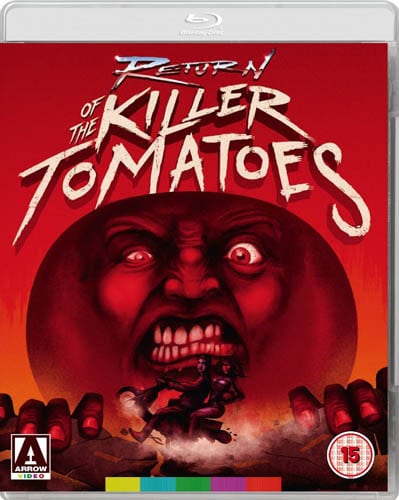
Be the first to comment